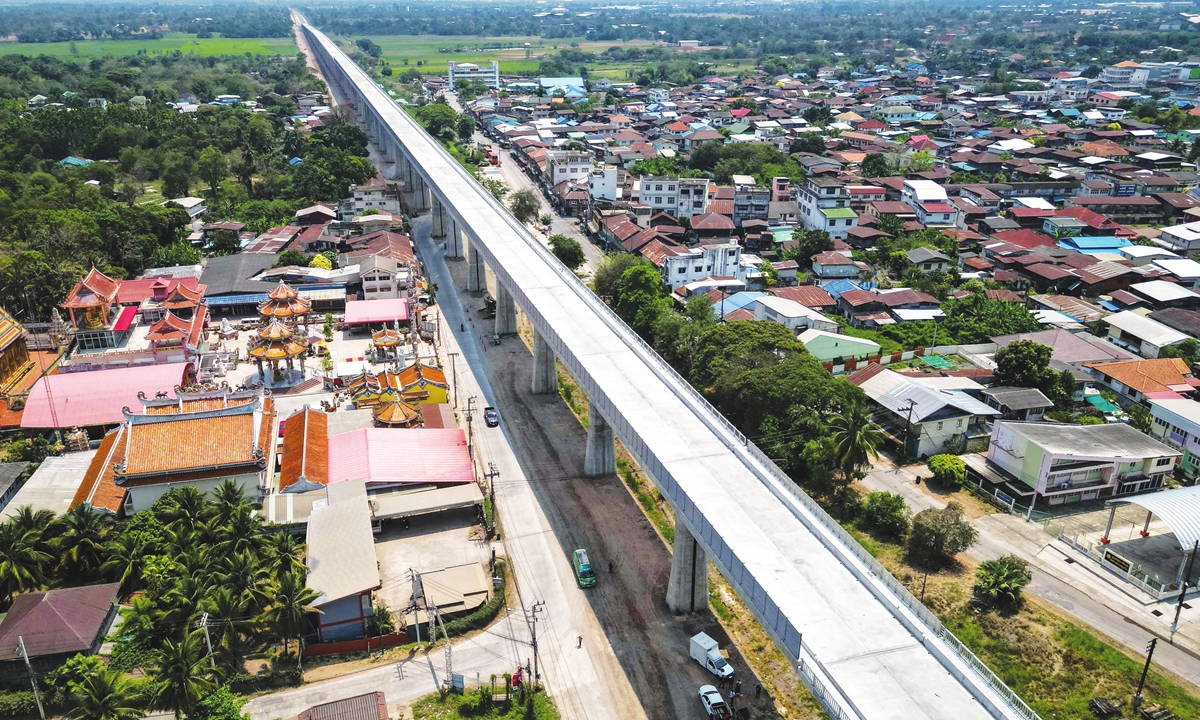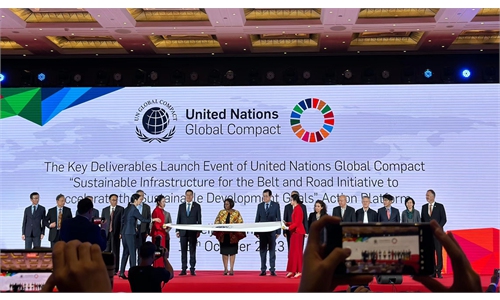
An elevated track, under construction as part of the Thai-Chinese Bangkok-Nong Khai high-speed railway project, in Nakhon Ratchasima province on March 29, 2023 Photo: VCG
In the past few days, the Belt and Road Initiative (BRI) has gained momentum. There are several official justifications for the BRI, but from a civilian perspective, it may be seen as China's benign and mutually beneficial release and export of its huge infrastructure and manufacturing capabilities to the world. It establishes China's path and pattern for further rise and shapes the interaction between China and the world. The BRI is likely to become the most important exploration and practice for the transition from geopolitical competition to a new model of cooperation and win-win in international relations in the 21st century, and it may eventually become a watershed in international political thinking.
According to conventional geopolitical reasoning, forceful expansion with a zero-sum mentality is necessary for all nations to rise, and the expansion is frequently led by gunboat diplomacy. Rising powers have consistently followed this trend throughout history. China, in the past, was often referred to as a "continental country" and is still "blocked" by the first island chain. We were surrounded by some unfriendly forces. The US is aggressively constructing the Indo-Pacific Strategy against China, which appears to be pressuring and urging China to end the "encirclement" through aggressive measures, including military confrontation.
The BRI, however, distinguishes China from all other conventional big powers. It violates the idea of a zero-sum game and doesn't even fit the conventional concept of "national strategy," or a tool used to advance the objectives of a single nation. More accurately, it is a revolutionary way of thinking. The BRI creatively connects China's national interests with the interests of most countries in the world and achieves mutual connectivity with the development plans of many countries and regions. It is unprecedented in terms of openness.
From a traditional geopolitical perspective, the US naturally wants to stop and undermine the BRI but finds it difficult to do so. How can it dispel the desire for high-speed railways and more highways from Indonesia to Serbia? How can it convince countries in Asia, Africa and even Europe to give up on their aspirations to build ports and power plants? Isn't that making it an adversary of the entire world? The US pondered for a long time and came up with the label "debt trap" to describe the relationship that China apparently has with the countries participating in the BRI. However, because the label is so far-fetched and contradicts the reality, it has been shelved despite being widely publicized.
The BRI is rapidly becoming the largest-scale development project for undeveloped regions in human history. And China emerges as the driving force and leader of this global transformation. China's interests are closely connected with the interests of other countries. If the US wants to undermine China's interests, it will also harm the interests of many other countries, thereby attracting joint opposition from multiple countries. While the US is still keen on rallying allies to consolidate its strategic defense line, China has already rewritten the program for the rise of a major power and opened up a new space for China and developing countries to move towards prosperity together. The BRI is actually changing the nature of international competition. It is promoting a competition that includes more constructive factors. For example, stimulated by the BRI, both the US and Europe have launched their own plans to participate in infrastructure construction in the third world, bringing forgotten regions such as Africa and the South Pacific back into the Western vision.
I believe that the grand history of humanity will undoubtedly give the BRI a favorable evaluation. As China becomes stronger, there will be more and more successful cases of the BRI, making it increasingly attractive. It will eventually leave a profound mark on the 21st century. As a Chinese netizen said, "The world is in tatters, and the rabbit is patching it up." This metaphor is vivid and expressive. The BRI is the route that the rabbit diligently patches up, and as the rabbit is doing a good deed, it will surely receive good returns in the end.
The author is a Chinese media professional. opinion@globaltimes.com.cn



